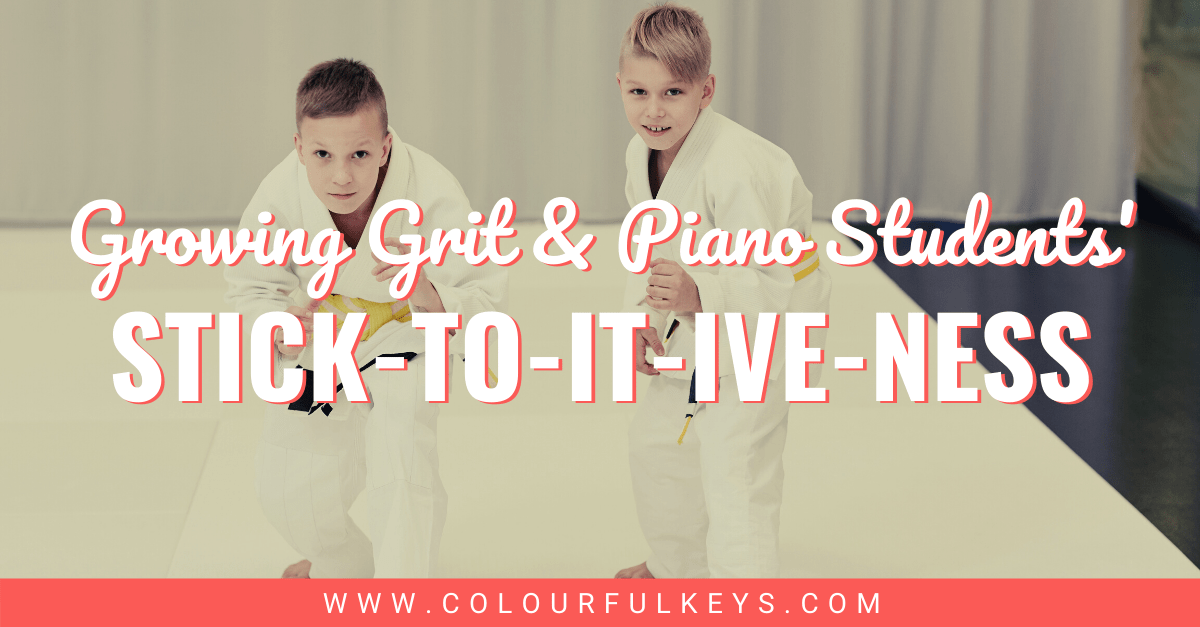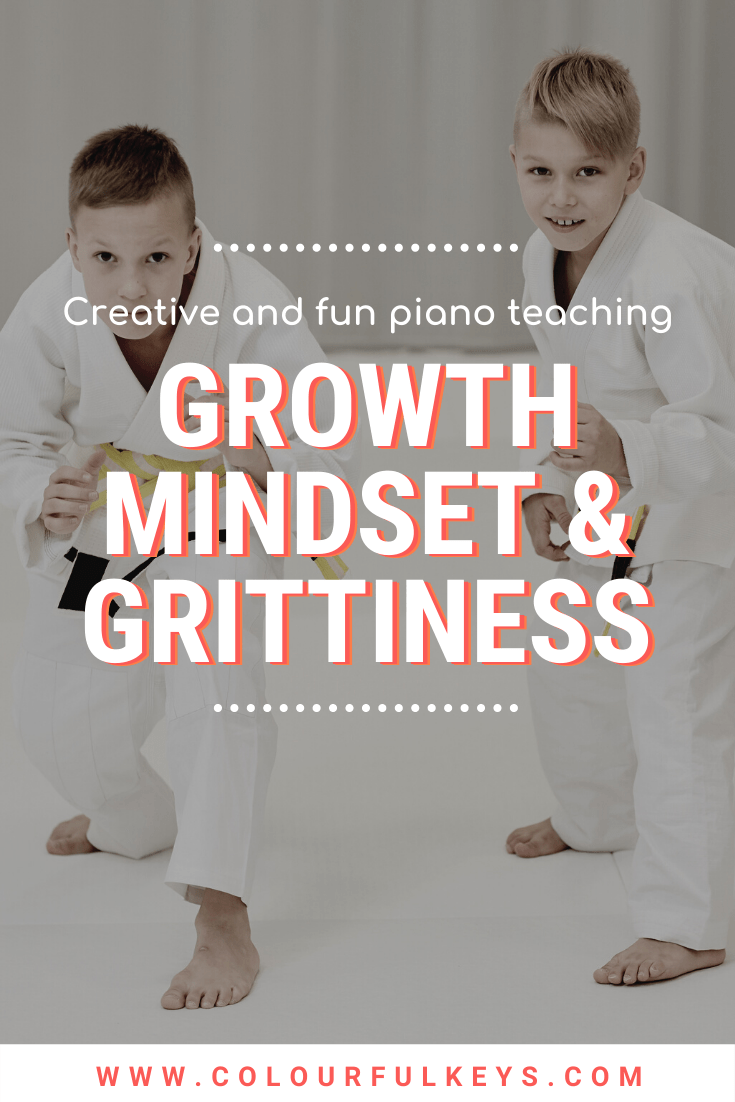Do some of your piano students seem to throw their hands in the air at the first whiff of a struggle and difficulty? What they need is grit.
They need the determination and self-belief to keep going when things get hard.

⬆️ Listen to the podcast above or keep on reading, whichever fits your style. ↙️
The work of Carol Dweck and Angela Lee Duckworth has shown that a growth mindset and grittiness are keys to success in many areas. Research has also shown that learning a musical instrument can lead to the development of grit.
“Grit is passion and perseverance for long-term goals.”
Angela Lee Duckworth
We’ve all had a student quit at some stage. We’ve all wished a student could’ve just stuck it out a little bit more than they did.
As music teachers, we can either hope that piano students find their way to this determined attitude, or we can actively work to develop grit in our studios.
Grittiness can mean the difference between sticking with lessons and quitting. Internalising a growth mindset can put the difficulties of learning an intricate new skill into perspective and encourage us to keep going when things feel hard.
Is Grit a Natural Talent?
If we’ve met before, you probably know that I hate the word “talent”.
That’s because most people use the word as a cop-out. They see a 9-year-old play ‘The Wild Rider’ and exclaim “oh, she’s so talented!”
But we know that little single-digit human has been practising almost every day for the past 4 years. She didn’t just graduate from nappies, walk over to the piano and instinctively know where middle C was and how to play with beautiful tone.
It took work.
The truth is, most adults would prefer to say that she’s talented rather than acknowledge they could do that too if they put in the effort.
I’m not saying natural tendencies and strengths are irrelevant. There are many possible natural talents that could make you a better musician, like:
- Listening
- Hearing
- Coordination
But GRIT is probably the biggest advantage for piano students. And it’s normally left out of the musical talents list.
Naturally Gritty
I’ve always said that “stick-to-it-ive-ness” was my one natural talent. Growing up, I wasn’t gracefully coordinated (I’m still not, hello broken wine glasses!🤣) and I didn’t have a razor sharp mind or a finely-tuned ear.
But I did not give up. Ever.

Not every student is as naturally gritty as I am. There are also environmental factors that can squelch natural grittiness.
Grit Inequality
As with many things in this world, grit is not fair. Some students will be born grittier than others…but DNA isn’t the only factor here.
Parental support plays a huge role in how likely students are to stick with lessons and be successful in music.
Think about it. How much grit do you need to bring to the table if you have a parent who…
- Sits with you while you practice
- Has studied music them self so can help when you get stuck
- Talks about music around the house
- Takes you to concerts so you can see the magic of what these years of practice can do
- Encourages you through the ups and downs
Now consider the perfectly well-meaning parent who drops their kiddo off to lessons each week and considers their role done there. Who needs more grit?
Not only do students have different amounts of grit in reserve, but they also need wildly different quantities of grit to be able to become lifelong musicians.
I want to help all music students find the joy in sticking with something through the challenges. And if you want to solve a problem, you need the right tools for the job.
For more tips and tools to help your students practise better, visit my page devoted to Teaching Piano Practice.
7 Keys to Grit for Piano Students
When I was researching the special Gritty Critters series of games for our music teacher membership, I took all the ideas and theories and whittled them down to 7 key elements of grit for piano students. These aren’t meant to be all-encompassing, but I do believe they’re the most important and most cultivable factors for piano students.
Almost
Did you ever have a teacher who added “yet” to the end of your sentences?
My Irish dancing teacher always did. Any long-term student of hers who heard someone say, “I can’t do this” could turn around and exclaim “YET!” right with her. I probably thought it was silly at the time, but I now see its power! 💪
The word ‘yet’ implies that we can do it someday and that all we need to do is keep putting in the work to get there.
Sesame Street probably says it better than I ever could. 🙂
(Carol Dweck actually has a TED Talk about “the power of yet”…but I thought the Sesame Street video was too much fun not to share. Great to send to your kiddos, too!)
Brain
Understanding your own brain is an amazing thing. It can make frustrations less frustrating and wins that much sweeter.
You don’t have to go get a degree in neuroscience to incorporate a little meta-cognition into your lessons.
For example, you can explain the 2 sides of the brain to your students and how every time they play a section they’re building a route across the brain. We have to repeat it with accuracy multiple times to make the correct pathway stronger. This makes it the easiest road for our brain to follow the next time we try to play that section.
If you explain this simply enough, even a 5-year-old will get it and the understanding will make their practice so much more meaningful.
Conscious
The practice of coming back from distractions and focussing on the task at hand can also help students develop stick-to-it-ive-ness. When we’re thinking about pizza instead of the music we’re making, it has 2 big detrimental effects:
- We make less progress since we’re not paying attention to what we’re doing.
- We don’t learn to enjoy the learning process. We always see it as something to get through rather than appreciate it as it happens.
That second one is especially vital for long-term grittiness. Making faster progress can help us enjoy playing more and perhaps stick with lessons, but if we can get students to see the process as the candy, that’s where the magic happens.
Bringing your students’ attention to their senses and breathing is a great way to keep them in the present moment. The feel of the keys or the rhythm of their chest rising and falling can give them something to busy their mind with which is relevant to their practice.

Talking about distractions, acknowledging them and then coming back to the task at hand is another great practice for working on mindfulness. Have an open conversation with your students about these thoughts, so they know it’s normal for your mind to drift from time-to-time. It’s part of the process.
Delight
Have you ever had a student who opened up a new piece, saw a fiendishly difficult passage the likes of which they’d never tackled before and proclaimed, “Ooh, cool! I love a challenge!”
It’s not the stuff of dreams. I’ve had that student, and you can too.
Delight means getting excited about learning opportunities instead of groaning because something looks too hard.
As long as you’re giving your students the right level of challenge, you can absolutely train them to think this way. It starts with speaking this way.
Yes, it might sound hokey to your students at first to have to tell you what they’re most looking forward to about something challenging. Just take the eye-rolls or nervous laughs on the chin.
Over time, it will become part of their natural vocabulary.
Cultivate the habit now and wait for the day when you hear your student’s school, dance or swimming teacher marvelled at their willingness to volunteer for difficult tasks. You’re welcome, world.
Exhale
One of the many distinctions between good practisers and inefficient practisers which I’ve learnt from Noa Kageyama’s blog is that the good practisers leave a moment between repetitions.
It sounds too simple to make a difference, but those who go straight from one repetition to the next without even a second of reflection are just going through the motions. Inserting the time to take a breath will help your students to set an intention for each repetition.
For young students, I believe we can start with just the breath. We don’t even need to talk about goals for the next repetition. Then, once this habit is ingrained, we can work with them to use the breathing room effectively.
Like the “Conscious” key to grittiness above, this helps students to participate in and enjoy the process of learning which is essential for developing a stickier attitude to piano.
Flagrant
This is the first one which might make you squint at the screen a little. What do I mean when I say our students should be flagrant?
I’m being a bit facetious here (another F word, ding, ding, ding!) but stay with me because I’m sure you’ve had this student…
They go to start playing a piece, nervously move their hands across the surface of the keys and say “sorry, sorry!” Once they find their starting spot, they play a few bars before you hear “ugh”, then “oh, no…” and then a sigh and then another “sorry, sorry, sorry” at the end.

This student’s playing could be beautiful. It might need a lot of work. But either way you’re not going to get to enjoy it because of their constant apologies.
There’s nothing to excuse when you play a wrong note. It’s part of the learning process and, nearly inevitably, part of the performance process.
Train your students to flagrantly make mistakes and be unabashedly unapologetic about it. This is all part of growing as a musician.
Glorify
The final key to growing grit in your piano students is to take time to look back together.
Too often in music (and life) we’re focussed on the next thing. We try a piece at the next level, we push onto the next exam, we tackle something bigger for the next performance.
Music is a long journey, and we forget where we came from. Help your students to remember and reflect by playing old pieces, look back at former books and talking about something they’ve mastered that used to be challenging for them.
The few minutes you spend glorifying past achievements will make future success much more likely. 😄
Do you work to develop grit in your piano students?
If any of these 7 keys rang true for you, or if you have more to add, I’d love to hear your thoughts in the comments below.

Excellent article, Nicola! I needed this. Thank you! 🙂
Thanks, Karissa!
This is a wonderful article, brought to life by your masterclass this week. Thank you Nicola!
You’re welcome!